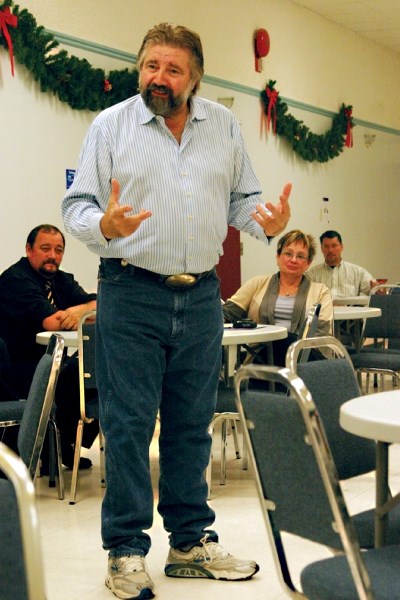A Progressive Conservative (PC) party meeting attended by two ministers discussed health care, the super-board, and its shortcomings in Bonnyville on Thursday.
PC party members met for the Bonnyville-Cold Lake constituency association's annual general meeting at the Seniors Drop In Centre on Thursday.
President of the Treasury Board Lloyd Snelgrove, and Minister of Infrastructure Ray Danyluk presented their thoughts on various provincial policies and answered questions from party members.
A discussion on health care arose after a question from the floor from MD of Bonnyville resident and former MD councillor Delano Tolley. Tolley compared the centralized health care in Alberta to the failed centralized programs in the former Soviet Union. He criticized the health super-board and asked if the province had thought of moving back to the local hospital boards and health authorities.
"Where we were 30 years ago and where we are today is completely different," responded Danyluk. "We didn't have the technology or the capability to be able to deal with some of the issues that we are today."
He said specialists have centred in the cities and took health care funding with them. "Things have changed. We can't just go back to an individual board because now the service is different."
The several hundred boards and regional (health care groups) "weren't able to control the costs or deliver the level of technical expertise," Snelgrove said.
He said health care costs are increasing between eight and 12 per cent a year. If the economy grows at four per cent and health care at 12 per cent, which accounts for 40 per cent of the provincial budget now, in 17 years, "We're out of business," Snelgrove said.
"We didn't sit down as a government and say, in the biggest corporate merger in Canadian history, we didn't stop and check off along the way to know that we had the foundation for a functioning board to work."
"I can guarantee Genia (Leskiw) or Ray (Danyluk) or I, or the premier, are not going to sit there forever blindly saying the super-board's the answer."
However, a sound argument can be made for a provincial health strategy that is delivered and monitored locally, said Snelgrove. The system should include a province-wide electronic information system, he said.
The centralized board may be OK, but the board might decide that it needs more vice presidents or regional presidents, he said. "But I've got to say we may have forgotten the good old days weren't all that good either."
"We're struggling with this... We're not in there to destroy health care, I will tell you that, and when I see the dollars that are going out there, and the result is not getting better, I can tell you it's going to be a lot of work to fix it."
He said a discussion about the government structure is needed.
Snelgrove also took the opportunity to blast the federal government over differences between provinces in health care funding.
"If we were funded the same as any other province in Canada, we would receive $822 million more," he said.
He added that the former federal health minister Tony Clement changed the health care funding three years ago from the agreement, signed by former Alberta premier Ralph Klein in 2004, that said funding would stay the same unless provinces agreed to change it.
"(The federal minister) didn't ask us, didn't give a shit then that Ralph signed one (agreement) that said (funding wouldn't) change."
He said it is "unconscionable" that no Alberta MP has said that the province gives the federal government $21 billion and yet the province isn't funded the same as other provinces.



